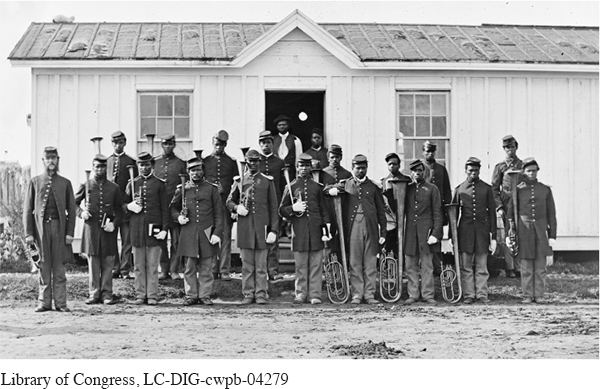African Americans Contribute to Victory
Lincoln’s election secured the eventual downfall of slavery. Yet the president and Congress did not eradicate human bondage on their own. From the fall of 1862 on, African Americans enlisted in the Union army and helped ensure that nothing short of universal emancipation would be the outcome of the war. As Private Thomas Long, a former slave serving with the First South Carolina Volunteers, explained: “If we hadn’t become sojers, all might have gone back as it was before. . . . But now tings can neber go back, because we have showed our energy and our courage and our naturally manhood.”
In the border states, which were exempt from the Emancipation Proclamation, enslaved men were adamant about enlisting since those who served in the Union army were granted their freedom. Because of this provision, slaveholders in these states did everything in their power to prevent their slaves from joining the army. Despite these efforts, between 25 and 60 percent of military-age enslaved men in the four border states stole away and joined the Union army. By the end of the war, nearly 200,000 black men had served officially in the army and navy, and some 37,000 blacks had given their lives for the Union.

Yet despite their courage and commitment, black soldiers felt the sting of racism. They were segregated in camps, given the most menial jobs, and often treated as inferiors by white soldiers and officers. Particularly galling was the Union policy of paying black soldiers less than whites. African American soldiers openly protested this discrimination even after a black sergeant who voiced his views was charged with mutiny and executed by firing squad in February 1864. The War Department finally equalized wages four months later.
One primary concern of African American soldiers was to liberate slaves as Union armies moved deeper into the South. At the same time, thousands of southern slaves headed for Union lines. Even those forced to remain on plantations learned when Union troops were nearby and talked openly of emancipation. “Now they gradually threw off the mask,” a slave remembered, “and were not afraid to let it be known that the ‘freedom’ in their songs meant freedom of the body in this world.”
Exploring American HistoriesPrinted Page 435
Exploring American Histories Value EditionPrinted Page 323
Chapter Timeline